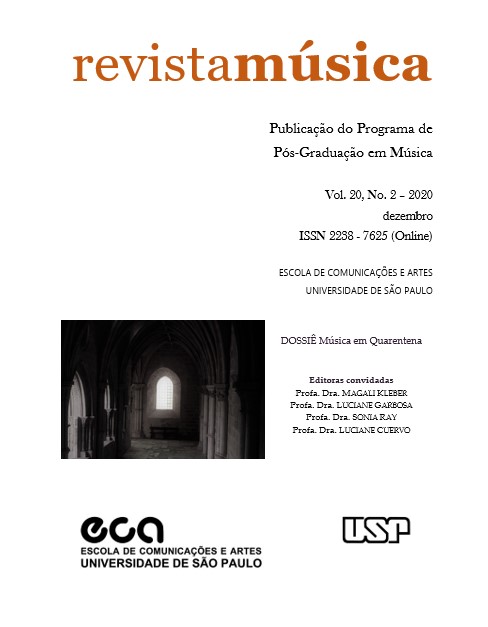Sisterly Conflict: Music and Text in Richard Strauss' Elektra (1909)
DOI:
https://doi.org/10.11606/rm.v20i2.169716Palabras clave:
Richard Strauss, Elektra, Chrysothemis, Music and Text, Perspectival leitmotifResumen
This paper undertakes a careful musical and lyrical analysis of Chrysothemis’ first interaction with her sister (“Elektra!/Ich kann nicht sitzen und ins Dunkel starren”) in Richard Strauss and Hugo von Hofmannsthal’s 1909 opera Elektra. The paper’s fundamental claim is that Chrysothemis is portrayed differently by Strauss and Hofmannsthal: where the text brings the sisters together by means of a cross-pollination of images that emphasizes their shared heritage as daughters of Klytämnestra, the music – through abrupt shifts in style, melodic development, and harmony – prefers to present the sisters in diametrically opposing poles with respect to the family tragedy. By way of exploring the tensions between music and text in Elektra, the paper also investigates the ontological status of Klytämnestra’s leitmotifs as they come into view and argues that proper classification of their role – as well as an understanding of leitmotivic perspectivism – is essential in diagnosing an imbalance of power between Elektra and Chrysothemis vis-à-vis the orchestra.
Descargas
Referencias
ABBATE, Carolyn. “Elektra’s Voice: Music and Language in Elektra” in Richard Strauss: Elektra, ed. Derrick Puffett. Cambridge: Cambridge University Press, 1989, p. 107-27.
ADORNO, Theodor W. “Musik, Sprache, und ihr Verhältnis im gegenwärtigen Komponieren.” Jahresing, Stuttgart, 1956, p. 56-57.
BAYERLEIN, Sonja. Die Drei Frauengestalten in der Opera Elektra. Tutzing: Hans Schneider, 1996.
BONNELLIER, Rosaline. “Le poète et l’opéra : à propos d’Elektra, tragédie en un acte d’Hugo von Hofmannsthal, musique de Richard Strauss (1909) », L’Esprit du temps, vol 129, no. 4, 2014, p. 159-170.
CHESSICK, Richard. “On the Unique Impact of Richard Strauss’ Elektra.” American Journal of Psychotherapy, Vol. XLII, no. 4, 1988, p. 585-596.
CRAFT, Robert. Current Convictions. New York: Alfred A. Knopf, 1977.
DAHLHAUS, Carl. Die Musik der 19. Jahrhunderts. Wiesbaden: Akademische Verllagsgesellschaft Athenaion, 1980, p. 291-293.
DEL MAR, Norman. Richard Strauss: A Critical Commentary on his Life and Works: Volume One. Ithaca: Cornell University Press, 1962.
KIVY, Peter. “Musical Morality.” In Antithetical Arts: On the Ancient Quarrel between Literature and Music, 215-34. Oxford: Oxford University Press, 2009.
KRAMER, Lawrence. “Fin-de-siècle Fantasies: Elektra, Degeneration and Sexual Science.” Cambridge Opera Journal, Vol. 5, No. 2, 1993, p. 141-165.
PUFFET, Kathryn Bailey. Derrick Puffet on Music. New York: Routledge, 2001.
PUFFETT, Derrick. “The Music of Elektra: Some Preliminary Thoughts” in Richard Strauss: Elektra. Cambridge: Cambridge University Press, 1989.
STRAUSS, Richard. Elektra. New York: Dover Publications, 1991, comp. 1906-8.
TARUSKIN, Richard. “The Danger of Music and the Case for Control.” In The Danger of Music and Other Anti-Utopian Essays, 168-180. Berkeley: University of California Press, 2008.
WIKSHALAND, Stale. “Elektra’s Oceanic Time: Voice and Identity in Richard Strauss.” 19th-Century Music, vol. 31, no.2, 2007 p. 164-174.
Descargas
Publicado
Número
Sección
Licencia
Derechos de autor 2020 David Gomiero Molina

Esta obra está bajo una licencia internacional Creative Commons Atribución-NoComercial-CompartirIgual 4.0.
Autores que publicam nesta revista concordam com os seguintes termos:
- Autores mantém os direitos autorais e concedem à revista o direito de primeira publicação, com o trabalho simultaneamente licenciado sob a CC Attribution-NonCommercial-ShareAlike 4.0 que permite o compartilhamento do trabalho com reconhecimento da autoria e publicação inicial nesta revista.
- Autores têm autorização para assumir contratos adicionais separadamente, para distribuição não-exclusiva da versão do trabalho publicada nesta revista (ex.: publicar em repositório institucional ou como capítulo de livro), com reconhecimento de autoria e publicação inicial nesta revista.
- Autores têm permissão e são estimulados a publicar e distribuir seu trabalho online (ex.: em repositórios institucionais ou na sua página pessoal) a qualquer ponto antes ou durante o processo editorial, já que isso pode gerar alterações produtivas, bem como aumentar o impacto e a citação do trabalho publicado (Veja O Efeito do Acesso Livre).


